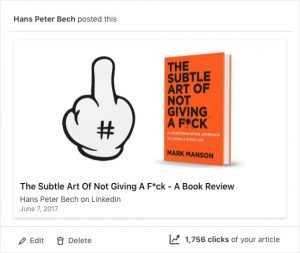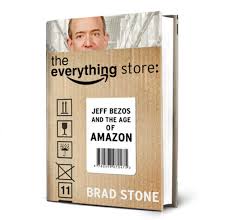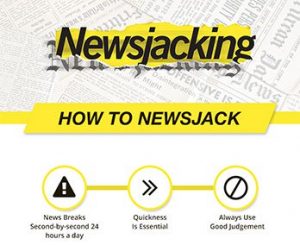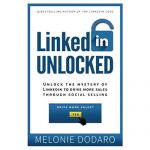Why Writing Book Reviews Is to Your Advantage
 It’s hardly surprising that, in my capacity as an author, I think book reviews are important and meaningful.
It’s hardly surprising that, in my capacity as an author, I think book reviews are important and meaningful.
My main message in this post is not how to please the authors, but how it can benefit you, the reader. There are many good reasons why writing book reviews are to the reader’s advantage.
You’re a brand (whether you like it or not)
When I get a serious inquiry from someone that I don’t know the first thing I do is Google their name.
 The top search result is always the person’s LinkedIn profile. Now I quickly assess whether there is consistency between what the person claims on his or her LinkedIn profile and what the other search results on Google indicates.
The top search result is always the person’s LinkedIn profile. Now I quickly assess whether there is consistency between what the person claims on his or her LinkedIn profile and what the other search results on Google indicates.
Usually, there is no consistency. And the reason is that the person has not yet posted anything on the Internet related to the areas of expertise highlighted on the LinkedIn profile. In other words, there is no digital footprint supporting the person’s brand promise.
When, on the other hand, there is a consistency, it helps to strengthen the credibility even before the first contact is made.
Although it may sound pretentious, we all have a brand. Only a few people have a strong brand, something they have created themselves. It will always pay off to work actively to strengthen your brand, especially optimizing your digital footprint.
The vast majority (not belonging to one of the groups celebrities, retirees and investors) will benefit from a relevant and clear digital footprint that makes them easy to find for potential customers and employers.
Killing several birds with just one stone

With book reviews, you can kill several birds with just a single stone.
Reading (or listening to) books remains one of the most serious ways to keep up to date with your professional domain. If you invest your time reading or listening, you might as well get some personal advertising for the money & time invested as well. With a book review, you get the opportunity to enhance your digital footprint that relates directly to your professional interests and skills.
Also, you will leave behind relevant professional keywords related to your name. This means that you may show up, too, in searches that use the same keywords. People who do not know you may now find you through the keywords.
You read books, that you intend to review, differently. You are more thorough, you take more notes and you consider the value of the content more carefully. When you have finished writing the review, you will also better remember what was particularly useful and what you may quickly forget again. You get more value from books that you review.
What is a book review?
 A review can be anything from a few lines to multiple pages of text. It’s up to you how much you want to write. Very short reviews like “This is a super good book” or “This book is not worth the money” have no value and are a waste of time to write.
A review can be anything from a few lines to multiple pages of text. It’s up to you how much you want to write. Very short reviews like “This is a super good book” or “This book is not worth the money” have no value and are a waste of time to write.
The more you write, the more relevant keywords it will include. You should preferably write over 400 words, about 1,200 words will be great while over 2,000 words are somewhat over the top (Google awards long posts!).
Keep in mind that book reviews are read by book readers and they do not mind reading a short essay if the content is good. And they often give it a like, add a comment and a share it with their network.
A review should not be a summary of the book. Summaries appear on the publisher’s or author’s website. It should be your assessment of the book’s content and it should be garnished with your personal experiences, insight and justified views.
Personally, I do not review non-fiction books that I do not like (on the other hand, I can be tough on fiction – especially when celebrity authors write bad books). Whether you want to follow the same line is up to you, but I usually put the bad books aside before I finish them and then I do not find it fair to write a review.
I prefer critical reviews with an edge and dislike reviews written just to please the author. The focus of the review should be on yourself and what you think is good or less good in relation to the book’s treatment of the subject, adding whatever experience and insight you may have. In this way, the text gets naturally filled with relevant keywords.
As you review more books on the same subject, you can link to previous reviews and enhance your digital footprint.
Where do you post your book review?
Most people associate a book review with newspapers or professional journals. However, getting a book review published in a printed newspaper or other professional media has only limited value for the regular reader, and it is also close to impossible to achieve.
 If you do not have the ambition of becoming a regular blogger, I recommend writing the review as an article on LinkedIn Publishing.
If you do not have the ambition of becoming a regular blogger, I recommend writing the review as an article on LinkedIn Publishing.
LinkedIn Publishing is a super easy way to blog and book reviews are a good way for linking relevant keywords directly to your LinkedIn profile.
You can also use Medium, which is a dedicated platform for bloggers. Personally, I like Medium, but I think most people who do not plan to blog so often will be best served by LinkedIn Publishing.
You can of course also establish your own blog, but if you do not write regularly and have a direct commercial objective (as I have), then it’s too much trouble.
 Many write short reviews on LinkedIn’s comments box and then tag the author. I cannot recommend that. The author is seldom the primary target audience for your review, and an entry in the comments box has a very short lifespan. It is better to post a short comment in the field and then link to your review, wherever it is located. This activity can be repeated over a few weeks. This will create traffic to your review and improve your ranking on Google.
Many write short reviews on LinkedIn’s comments box and then tag the author. I cannot recommend that. The author is seldom the primary target audience for your review, and an entry in the comments box has a very short lifespan. It is better to post a short comment in the field and then link to your review, wherever it is located. This activity can be repeated over a few weeks. This will create traffic to your review and improve your ranking on Google.
The book portals
 You should also briefly review the books you read on the book portals (typically where you bought it) and refer to your longer review elsewhere. Not all portals accept linking out (Amazon does not, Saxo does), so you have to write enough that other readers can find your full review. You can gather many like-minded people on the book portals. Just about anyone who is interested in the same book will at some point or another pass by. This gives you more traffic to your review -> better ranking on Google.
You should also briefly review the books you read on the book portals (typically where you bought it) and refer to your longer review elsewhere. Not all portals accept linking out (Amazon does not, Saxo does), so you have to write enough that other readers can find your full review. You can gather many like-minded people on the book portals. Just about anyone who is interested in the same book will at some point or another pass by. This gives you more traffic to your review -> better ranking on Google.
Book reviews on request
 When you start writing reviews, you will be contacted by authors who would like you to review their latest release. Often they offer you the book for free, to which I always say no thanks.
When you start writing reviews, you will be contacted by authors who would like you to review their latest release. Often they offer you the book for free, to which I always say no thanks.
First, books are cheap (especially in view of the investment the author has made in writing it) and secondly, you should not review books that you do not want to buy and read. Professional reviewers in commercial media are required to review certain books, but you do not have that obligation. And having first said ‘yes’ to the free book, you are morally committed to write something.
You can hijack other people’s reviews
 If you’ve reviewed a book that turns out to be or become popular, then you can hijack others’ reviews. When you see someone else’s review, you give it a like, add a short comment, link to your own review and share that other’s review on your social media profiles. You have now helped your review colleague and yourself. Your colleague receives additional exposure, while you will draw some of his or her readers to your review.
If you’ve reviewed a book that turns out to be or become popular, then you can hijack others’ reviews. When you see someone else’s review, you give it a like, add a short comment, link to your own review and share that other’s review on your social media profiles. You have now helped your review colleague and yourself. Your colleague receives additional exposure, while you will draw some of his or her readers to your review.
It’s a bit like newsjacking and may also work in the same way, especially if you are out early with your review.
Examples of reader reviews
If you would like a little inspiration, click here to read my Danish reviews, and click here to read my English reviews.








